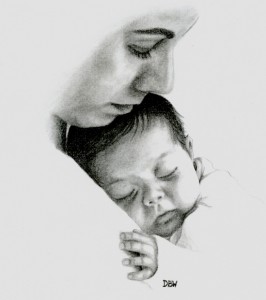 One day last week when I was dropping my 4-year-old off at preschool, Trevor’s mom was dropping him off at the same time (funny how most daycare moms don’t actually have first names: she’s Trevor’s mom, I’m Vaughn’s mom, etc.).
One day last week when I was dropping my 4-year-old off at preschool, Trevor’s mom was dropping him off at the same time (funny how most daycare moms don’t actually have first names: she’s Trevor’s mom, I’m Vaughn’s mom, etc.).
Trevor’s mom was walking on air. Beaming. Though generally pretty quiet, she was talking a mile-a-minute. She said she and her husband had found out the day before that they would be welcoming 3-week-old baby Lauren into their family the next day through a county adoption. Her joy was unmistakable.
She’s has been on my mind. I couldn’t help but think about how happy Trevor’s family is; how grateful they are that Lauren’s birth mother chose to carry, deliver and share her. I imagine it was not an easy or clear-cut decision. But the Holy Spirit reached this woman with a message of peace and comfort, letting her know that unexpected was not the same as unwanted; inconvenient was not the same as impossible; and what may have seemed like a hopelessly heavy burden actually turned into the most generous gift-giving opportunity of a lifetime.
She could’ve chosen differently: Roe v. Wade made that an option. This Saturday marks the day the Supreme Court ruled on the case 38 years ago: a decision that legalized abortion in the United States, for virtually any reason, or no reason at all.
Every year dioceses across the county observe January 22 as a day of penance “for violations to the dignity of the human person committed through acts of abortion,” and prayer “for the full restoration of the legal guarantee of the right to life.”
It’s a day to join together to pray for babies yet to be born, conversion of medical professionals performing abortions, for government leaders to recognize every person’s right to life, and for healing for every woman who has had an abortion.
It's a time to pray for women in complex and difficult pregnancies: for women whose pregnancies have left them feeling scared, confused, angry or pressured. And a day to consider how to help get the message to them that someone cares about their baby (actually, many “someones”); and someone (many someones) cares about each of them.
Copyright 2011 Julie Filby
About the Author

Guest
We welcome guest contributors who graciously volunteer their writing for our readers. Please support our guest writers by visiting their sites, purchasing their work, and leaving comments to thank them for sharing their gifts here on CatholicMom.com. To inquire about serving as a guest contributor, contact editor@CatholicMom.com.


.png?width=1806&height=731&name=CatholicMom_hcfm_logo1_pos_871c_2728c%20(002).png)
Comments